| Article ID | Journal | Published Year | Pages | File Type |
|---|---|---|---|---|
| 11032885 | Journal of Economic Behavior & Organization | 2018 | 27 Pages |
Abstract
Determining policy priorities is a challenging task for any government because there may be, for example, a multiple objectives to be simultaneously attained, a multidimensional policy space to be explored, inefficiencies in the implementation of public policies, interdependencies between policy issues, etc. Altogether, these factors generate a complex landscape that governments need to navigate in order to reach their goals. To address this problem, we develop a framework to model the evolution of development indicators as a political economy game on a network. Our approach accounts for the -recently documented- network of interactions between policy issues, as well as the well-known political economy problem arising from budget assignment. This allows us to infer not only policy priorities, but also the effective use of resources in each policy issue. Using development indicators data from more than 100 countries over 11 years, we show that the country-specific context is a central determinant of the effectiveness of policy priorities. In addition, our model explains well-known aggregate facts about the relationship between corruption and development. Finally, this framework provides a new analytic tool to generate bespoke advice on development strategies.
Related Topics
Social Sciences and Humanities
Economics, Econometrics and Finance
Economics and Econometrics
Authors
Gonzalo Castañeda, Florian Chávez-Juárez, Omar A. Guerrero,
